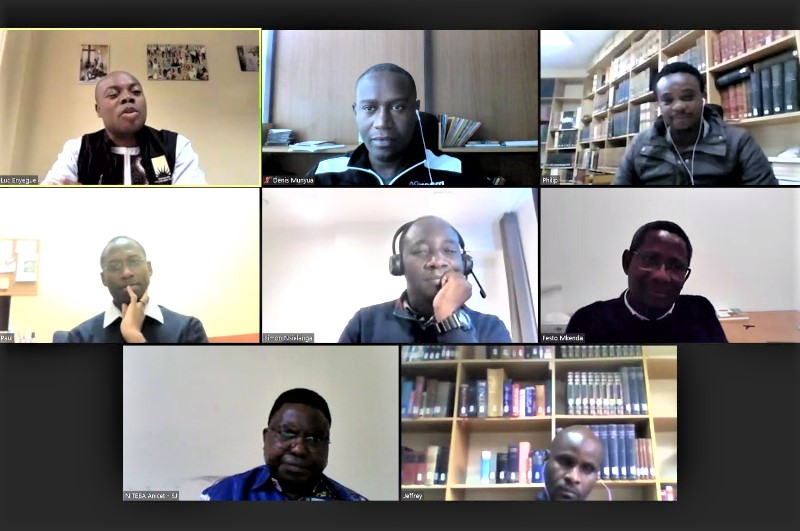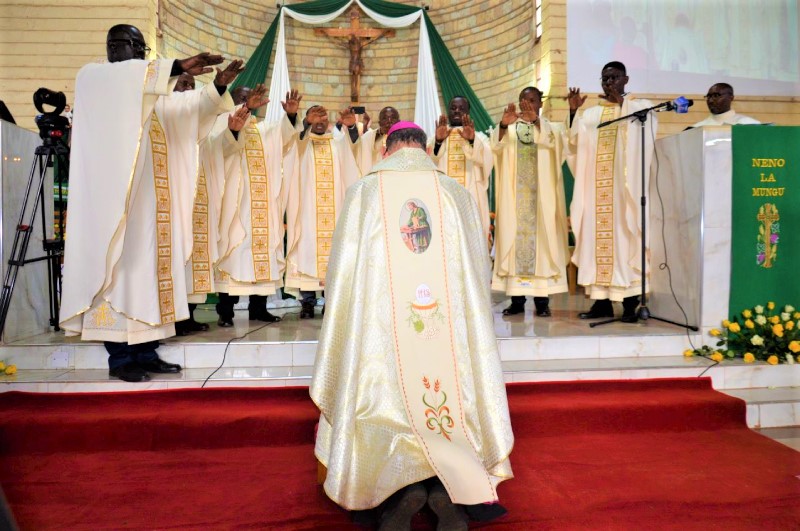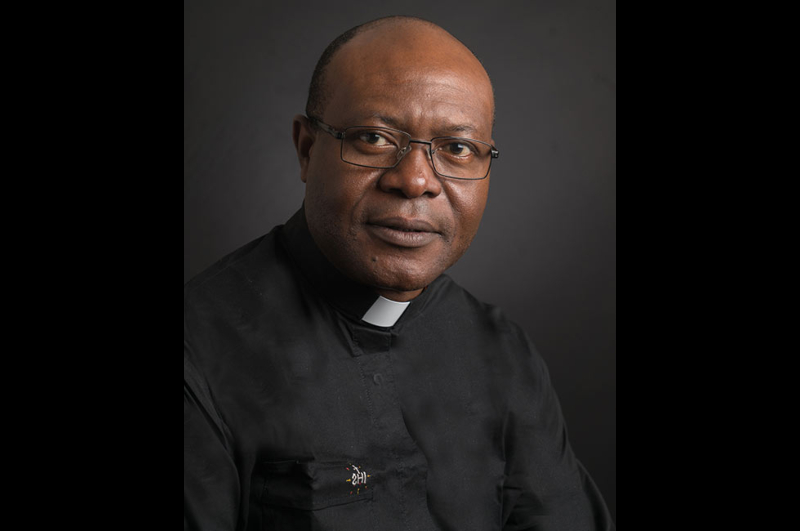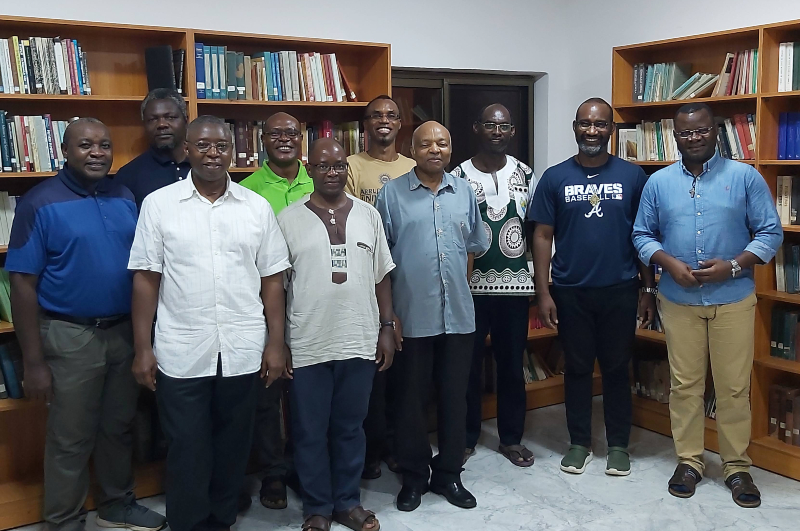



The creation of the Café of Jesuit Historians in Africa is presumed to have been the first online conference of its kind happening in Africa and Madagascar under the umbrella of the Jesuit Conference of Africa and Madagascar (JCAM), courtesy of the Jesuit Historical Institute in Africa (JHIA), Nairobi.
Dr. Anicet N’Teba Mbengi, SJ who is the Associate Director of the JHIA, made some valuable efforts in identifying and reaching out to great Jesuit scholars of history in the continent, who have degrees in related fields and those who have published books, articles, or even those who have shown interest towards the vision of the café.
The core ideas that led to convening the forum were to initiate fraternal exchanges focusing on history discipline. The platform, therefore, intends to provide a space for historians to reflect, discuss, and share and most importantly, contact research revolving around the histories of the church, the Society of Jesus (SJ), cultures, traditions, and religions of the people of Africa and its adjacent islands.
The late Superior General of the Jesuits, Most Rev. Adolfo Nicolás, SJ (May His Soul Rest in Peace), had a vivid vision for history in entire Africa and he once said, “It is about time to allow every continent to interpret its own history.” My rational thinking implies that it is only fair that Africans are allowed to interpret their hi-story. The Café is an opportune moment for historians to converge and learn emerging ideas as well as get a chance to re-interpret and possibly defend what was written or said about African history.
Dr. Festo Mkenda, SJ a participant and Academic Director at Archivum Romanum Societatis Iesu (ARSI), explained that this café will help historians identify topics of interest for discussion, for example, the history of Christianity especially the Society of Jesus in the continent of Africa and we shall also be able to figure out and plot pertinent things of common interest in respect to the development of the church and the continent, in the next 15 years and beyond.
Contributors are encouraged to share and propose opportunities to be exploited, for this will help to promote the history of Africa, especially in the areas that are understudied, for instance, Africa that is leading in that score, followed by Asia and Latin America. Organizing bi-annual conferences could also aid scholars to reflect on issues of mutual concern in a forum such as this one since most of them are on different missions.
There is a necessity to identify a reputable editorial manager from among the team of contributing scholars and give them the mandate to journey with upcoming historians in areas of their publications as we move to the era of post-restoration. It is somewhat heartening to say that historians and scholars are keeping valuable information and records on historical events. An example is a short history of the Southern Africa Province (SAP) that is being edited and translated into Portuguese by Fr. Mathew Charlesworth, SJ et al. They intend to have it printed in eight weeks and guaranteed to share the final product with JHIA in Nairobi for posterity with the original works already available in English. Besides that, the SAP is one of the provinces that have dedicated its time to making sure that JHIA receives timely updates on the biographies of Jesuits from their province.
Dr. Ekwueme Evaristus, SJ articulated concerns that the Historical Institute is little known in Jesuit formation centers and institutions of learning. He said JHIA can deal with this by directly making its contribution to the formation structure by involving the Deans, Principals, and Registrars working in Jesuit institutions to frequently talk about the JHIA and even send Regents to work at the institute during short vacations. Incorporating the institute into the Jesuit Research Network (JRN) is not a bad idea as it plays a role in all the areas of academic assistance. No matter how small the impact is, its presence will be felt and known. By doing so, we promote the idea of the study of history in Africa that will help change the narrative on how African history is viewed by other continents. Promoting a historical week could similarly be a positive endeavor because it will allow upcoming historians to access and share resources. This platform can be utilized to liaise with novice masters in developing part of the programs that can be used in teaching the novitiates.
In addition, Dr. Jean-Luc Enyegue, SJ clarified that in his capacity as the JHIA director and Dr. Anicet N’Teba Mbengi, SJ are actively involved in reaching out to Provincials whenever they visit Nairobi. “…in fact, Anicet and I are aggressively reaching out to Provincials whenever they come to Nairobi. We will invite them to JHIA and explain to them what we are doing, why what we are doing is really important for their province and why we need them to train young men for Jesuit studies not only Jesuit history, Ignatian spiritual, pedagogy, and even the Constitution of the Society”. That is not all; whenever talent is identified at Hekima University College or Community, the name of the individual is usually recommended to Provincials making sure that the JHIA is put into consideration because our vision and mission are all about the Society of Jesus. “If Jesuits are not interested in Jesuit Studies, at one point it will really affect the understanding of our own identity of the Society of Jesus.” As part of the outreach to formation houses, they make themselves available to novice masters and tertianship directors for history courses to novices and the tertians. So far, the novitiate of Bafoussam has favorably responded to the outreach program. Contacts have been made with Institut de Théologie de la Compagnie de Jésus (ITCJ) and Kimwenza as well. We would like to encourage Jesuits to utilize our monthly JHIA newsletter by writing articles and sharing relevant information. The good news about the JHIA Publications is that the JHIA strongly inspires all Jesuits even those teaching other courses outside of Jesuit studies to publish their works. So long as one can highlight Jesuit or Ignatian perspectives in their content. The Jesuit Historical Institute in Africa will be more than willing to support the publication of such content. Lastly, a suggestion was made that the Café of African Jesuit Historians is named after a renowned historian Engelbert Mveng, SJ.
Related Articles
Select Payment Method
Pay by bank transfer
If you wish to make a donation by direct bank transfer please contact Fr Paul Hamill SJ treasurer@jesuits.africa. Fr Paul will get in touch with you about the best method of transfer for you and share account details with you. Donations can be one-off gifts or of any frequency; for example, you might wish to become a regular monthly donor of small amounts; that sort of reliable income can allow for very welcome forward planning in the development of the Society’s works in Africa and Madagascar.
Often it is easier to send a donation to an office within your own country and Fr Paul can advise on how that might be done. In some countries this kind of giving can also be recognised for tax relief and the necessary receipts will be issued.




